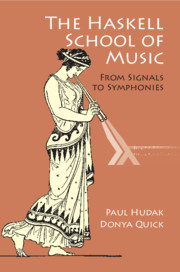Crossref Citations
This Book has been
cited by the following publications. This list is generated based on data provided by Crossref.
Kholomiov, Anton
2019.
Csound-expression: Haskell framework for computer music.
p.
61.
Melkonian, Orestis
Ren, Iris Yuping
Swierstra, Wouter
and
Volk, Anja
2019.
What constitutes a musical pattern?.
p.
95.
2019.
Publications Received.
Journal of the American Musicological Society,
Vol. 72,
Issue. 1,
p.
308.
Han, Yan
Amin, Nada
and
Krishnaswami, Neel
2019.
Representing music with prefix trees.
p.
83.
Cong, Youyou
and
Leo, John
2019.
Demo: counterpoint by construction.
p.
22.
Melkonian, Orestis
2019.
Music as language: putting probabilistic temporal graph grammars to good use.
p.
1.
Janin, David
2020.
Practical Aspects of Declarative Languages.
Vol. 12007,
Issue. ,
p.
131.
Henz, Martin
Koh, Shang-Hui
and
Sounderraman, Samyukta
2021.
Teachable moments in functional audio processing.
p.
65.
Agon, Carlos
Haddad, Karim
and
Romero-Garcia, Gonzalo
2024.
The Maquette Monad.
p.
45.
Stutter, Joshua
2024.
Data structures for music encoding: tables, trees, and graphs.
Journal of New Music Research,
p.
1.



